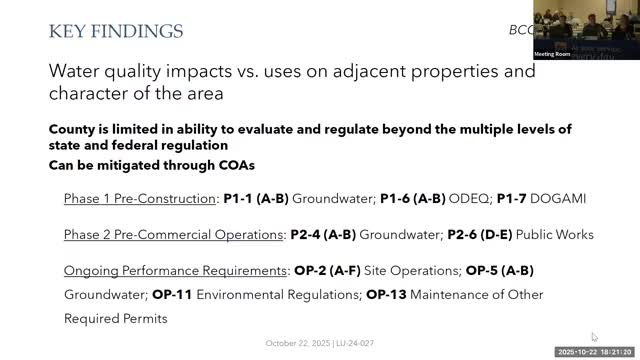Cities, haulers and business groups tell Benton County expansion needed to avoid higher rates, longer hauls and illegal dumping
Get AI-powered insights, summaries, and transcripts
Subscribe
Summary
Representatives from cities, regional haulers and the Oregon Refuse and Recycling Association urged commissioners to approve the expansion, arguing Coffin Butte is a necessary regional facility and that denial would raise costs, increase truck miles and spur illegal dumping; proponents pointed to staff’s proposed conditions and technical reviews.
Several municipal leaders, trade groups and waste haulers testified in favor of approving the Coffin Butte Landfill expansion at the Oct. 22 hearing, framing the issue as a regional infrastructure decision with economic and service consequences.
Officials from Newport, Newberg, Albany and representatives from the Oregon Refuse and Recycling Association (ORA) told the board that Coffin Butte serves multiple counties and that permitting timelines and geographic constraints make a rapid alternative infeasible. ORA’s executive director told the board that modern landfills require high capital investment and regional scale to operate safely and affordably; she asked the commissioners to approve the expansion.
Local haulers and Republic Services representatives stressed that rejecting the expansion would require longer truck hauls to more distant facilities, increase greenhouse gas emissions, raise tipping fees for households and small businesses and could lead to more illegal dumping. Rob and Amy Thompson, operators of a family waste hauling business in Newport, said they rely on Coffin Butte for day‑to‑day operations and that the denial of an expansion would have immediate rate impacts for Lincoln County residents, where poverty rates and median incomes are lower than in adjacent counties.
Several proponents also cited staff’s recommended conditions as appropriate safeguards and noted that Republic Services voluntarily reduced the size of the expansion and proposed limits (including a proposed 1,000,000‑ton per year municipal solid waste cap and a 1,300,000 total ton cap) in response to community input. The company and supporters argued the county can and should attach conditions to the conditional use permit to address noise, odor, groundwater and litter while preserving regional disposal capacity.
Opponents countered that the regional receipts of waste (testimony cited that roughly 93% of waste at Coffin Butte is from outside Benton County) and the potential for company noncompliance raise questions about whether short‑term revenue and convenience justify long‑term environmental and community costs.
The board received these competing economic and policy arguments and continued the hearing to Nov. 4; staff indicated the record will include documentation on franchise agreements, tonnage caps and the financial assumptions underlying the applicant’s commitments.
